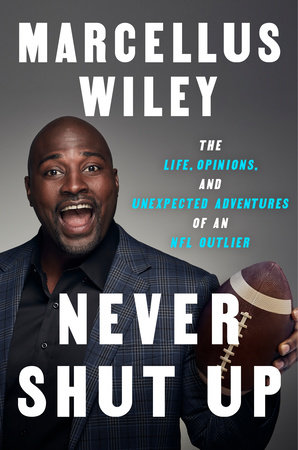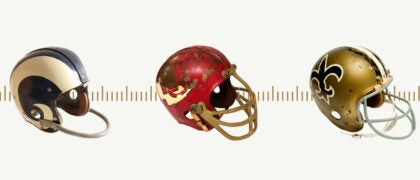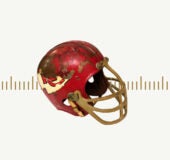INTRODUCTION THE CAMERA CREW got to our apartment at six in the morning that Saturday. A whole team from CNN—sound, makeup, producers, the whole deal—squeezed into my tiny childhood home in South Central, there to broadcast live during the 1997 draft.
This was the same place I had grown up. Sharing a room with my sister that wasn’t even a room, just a nook with a sheet hung up for privacy. Listening to NWA songs about shootings and drugs and gangs, about things I saw every day on the streets. Sitting on the floor my freshman year of high school, staring into space as I iced my aching, inflamed knees, wondering if I’d ever achieve my NFL dreams and get my family out of the hood.
Now, after all those years, all those struggles, here was a CNN camera crew right in our living room to watch as I finally got chosen by some team, any team, to play in the League.
Of course, first they had to figure out how to fit all their shit into the damn place.
By the time they unloaded all their gear, all their equipment, all their mics and cameras, we looked around and realized there was nowhere left for any actual people to sit! The CNN guys took a look around, scratched their heads, and promptly got rid of half their stuff, making barely enough room for me and my family to watch my fate unfold on TV.
A lot of the potential first‑round picks were actually attending the draft, which was in New York City, but I didn’t get a formal invite. I’d flown myself home for the weekend, using some of the money from my agent’s advance. Besides, I wanted the world to see my roots, see where I was from, a background I was both proud of and fought every day to improve on.
I also wanted to be around plenty of my friends and family—to help me through both potential “oh shit” moments. That’s “Oh shit, I just got picked in the first round and let’s party”
or “Oh shit, it’s the seventh round and are these people ever gonna call my damn name?” I was projected to go somewhere in the first couple rounds, but that’s the thing about draft projections. No matter what Mel Kiper might say, he wasn’t the one signing the contracts. It all came down to the teams, and no one—no one—could predict exactly what they’d do.
I settled in with Mama, my dad, Grandma, my sister, Tiki, and my best friend, Jabari, and every other uncle, second cousin, and halfway former acquaintance from down the block who could cram into our place. When a kid from the block was about to make it big,
everyone wanted a piece.
Because we were on the West Coast, three hours behind the New York broadcast, it was early as hell, but I was so pumped my eyes were peeled wide open. I knew there was no way I’d get chosen in the first few picks—those spots were reserved for college superstars, not standouts like me from Columbia University, an Ivy League school with a notorious history of awful football teams.
But I didn’t care, I was still listening to those announcements with every cell of my ear canal. I wasn’t even waiting for my name, a syllable or two would’ve been enough to set me off.
Mmmaaaa— Mmmmmaaaaarrrrr— Mmmmmmmaaaaarrrrcelllll—
Give me a sound, baby! That’s all I need! I’m begging you!
But no. Pick one came, and the name I heard didn’t start with an “M.”
“Orlando Pace, of Ohio State!”
Oh yeah, I forgot that
everyone in the world knew number one was gonna be Pace. Shit, I needed to chill! Okay, fuck that, time to focus on number two.
“Darrell Russell, of USC!”
Okay, alright. I knew Russell would be up there too, that made sense. Just had to look at three.
“Shawn Springs, of Ohio State!”
Fine, fine! So I wasn’t gonna be three. No one even thought I would be three, whatever. On to the next one. And the next, and the next.
What really killed me, though, wasn’t even the names that were popping out. It was the wait between each announcement. That wait had always seemed easy in past years, when I had been watching for fun—minutes upon minutes spent interviewing the most recent pick, talking to the usual sports prognosticators, and, of course, giving the teams time for all their backroom deals and machinations—but now? When I was an actual prospect? When it was
my life on the line? That wait felt interminable.
Finally, right around pick fifteen, I started hearing those magic “Marcellus” syllables. Hold up, hold up—not because I was actually
chosen, nothing that good. But because Mel and all the other talking heads thought I was finally in range. One of the top five or six best available prospects, who could get picked literally any minute.
Alright, cool, I thought.
So I can be top twenty. I’m good with that, totally chill.
All while sitting on the edge of my seat and gritting my teeth down to the damn roots.
Shit! There went number twenty. And before I knew it, twenty-four. And then twenty‑eight.
By now, my name was at the very top of Mel’s list of dudes who hadn’t been selected yet.
Fine, I thought.
Second round it is.
Every now and then CNN would check in on me, ask me how I was doing. I’d give them my usual big smile, admit that I was feeling nervous—both because I was and because I knew that’s what they wanted to hear, what made for a good story. But deep down, at the bottom of my soul, I still felt good, still felt confident about everything.
See, I was playing with house money. No one—
no one—had expected me to get this far. I had grown up with so many guys who played college ball at the big, flashy schools, the USCs, the Notre Dames, the Florida States. But where were they now? None of them were projected to go as high as I was in the draft. Hell, none of them even got invited to the combine!
They had faced huge expectations and hadn’t lived up to any of them, despite all the advantages, despite doing exactly what they were supposed to do. I, on the other hand, had made my own path. I had always strived to be true to myself. To embrace my individuality and never follow the herd. To do everything I could to help my family in my own unique way.
I could’ve gone to a major football program in a premier conference if I had wanted to. But I chose to put my education first instead, to get an Ivy League degree as my safety net in case football didn’t work out. So I went to a school no one in my neighborhood had ever even heard of, and now, here I was, on the cusp of making it to the NFL.
Did I want to go high up? Of course. The higher you went, the more guaranteed money you were likely to get in your contract. But as long as I got in, as long as I made it into the League, I’d be happy no matter what the round. I had made my own path in the past, and I could do it again.
As the names and the minutes passed by, I started to zone out. All the emotional swings, all the anticipation and waiting, not to mention that early‑ass morning, were taking a toll. For hours I had been watching the TV, then suddenly it felt like the TV was watching me. I closed my eyes, just for a little, I told myself. Not to fall asleep, just to take a rest. Just to relax for a couple quick minutes. “Alright!”
My peace was shattered by that single word from my dad, a man of very few words who generally only expressed happiness when Emmitt Smith and his beloved Cowboys did something amazing on the field.
But this time, this word was for me. “ALRIGHT!”
I opened my eyes, shook my head until the fog cleared from my mind, and it hit me—I just got drafted.
The next thing I was aware of was simply screaming. My daddy was screaming, my mama was screaming, everyone was screaming. I looked at the TV and saw my name next to a big blue‑and‑red logo. I was the fifty‑second pick of the draft, selected in the second round by the Buffalo Bills.
“Bruce Smith!” was the very first sound that came out of my mouth. Followed very closely by “Marv Levy!”
At this point, the Bills of that era are remembered more for losing four Super Bowls in a row than anything else. But remember—to lose those Super Bowls, they had to get there first. They were a good fucking team, starring Bruce Smith, the greatest defensive end to ever put on a helmet.
To me, it felt like the universe had put me in the ideal situation. D‑end was my position too. I was physically gifted, yes—that’s why the Bills were taking a gamble on me—but I was also incredibly raw. I only had two years’ experience playing my position, something almost unheard of for a second‑round NFL draftee. And here I was about to play alongside the best D‑end in the business.
That wasn’t intimidating—that was a chance to learn, to grow, to hone my technique.
“ALRIGHT THEN!”
My dad was officially setting a record for word count.
The phone rang, and if shit wasn’t already real, it got even realer. “Hi, Marcellus,” the voice on the other end said. “Congratulations!”
It was John Butler, the Bills general manager—a man I had never met who was now officially my favorite person in the world.
“Are you ready to be a Buffalo Bill?”
“Yessir,” I said.
“Hold on, I want to let you talk to your coach.”
He put Coach Levy on, and I barely remember a word he said.
All I could think was,
I’m sitting in my tiny apartment off Slauson Avenue in South Central LA, surrounded by my family, my friends, and a CNN camera crew, and I’m on the phone with Marv Levy of the Buffalo Bills.
My crazy‑ass life had gotten even crazier. And it was just getting started.
Copyright © 2018 by Marcellus Wiley. All rights reserved. No part of this excerpt may be reproduced or reprinted without permission in writing from the publisher.







